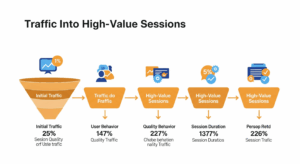You know, if there’s one thing in digital marketing that’s been consistently critical, it’s keyword research. But let’s be real, the way we’ve approached it has shifted dramatically, especially heading into 2025. Gone are the days of just stuffing a few high-volume terms into your content and hoping for the best. Today, it’s about understanding deep user intent, leveraging AI, and building a comprehensive content strategy that truly resonates with your audience.
If you’re still using the same keyword research strategies from five years ago, you’re likely leaving a lot of organic traffic and potential customers on the table. But don’t despair! This isn’t about starting from scratch; it’s about evolving your approach. Let’s explore how to find those elusive “right terms” that will drive real results for your business in 2025.
Beyond the Buzzwords: Smart Keyword Research Strategies for 2025
The landscape of Search Engine Optimization (SEO) is constantly in motion, and at its heart, keyword research remains the compass guiding our efforts. However, the influence of Artificial Intelligence (AI) on search engines and the way users interact with them means our approach to finding those perfect terms needs a serious upgrade. In 2025, it’s less about raw volume and more about the precision of a surgeon and the intuition of a mind reader.
Why Keyword Research Still Matters (Even More!) in 2025
Despite the rise of AI Overviews and conversational search, people still type words into search bars. And even when AI generates an answer, it pulls that information from well-optimized content. Keyword research is how you:
- Understand your audience: What problems do they have? What questions are they asking? What language do they use?
- Discover content gaps: What topics aren’t you covering that your audience is searching for?
- Identify competitive opportunities: What are your competitors ranking for that you’re not?
- Align with user intent: Ensure your content truly matches what searchers are looking for.
- Drive qualified traffic: Attract visitors who are genuinely interested in your products, services, or information.
So, while the methods are evolving, the core importance of keyword research remains undeniable.
Strategy 1: Deep Dive into User Intent – The “Why” Behind the Search
In 2025, understanding why someone is searching for something is far more critical than just knowing what they’re typing. Search engines, powered by sophisticated AI models like Google’s Gemini, are masters at interpreting user intent.
H3: Focus on the Four Main Search Intents:
- Informational: The user wants to learn something (e.g., “how to fix a leaky faucet,” “best hiking trails near me”).
- Your Strategy: Create comprehensive blog posts, guides, tutorials, and informational pages that provide thorough answers.
- Navigational: The user wants to go to a specific website or page (e.g., “Facebook login,” “Amazon customer service”).
- Your Strategy: Ensure your brand name, specific product names, and key landing pages are easily discoverable and have clear, consistent branding.
- Commercial Investigation: The user is researching products or services before making a purchase (e.g., “iPhone 15 pro max review,” “best CRM software for small business”).
- Your Strategy: Develop comparison articles, product reviews, detailed service pages, and case studies. Provide unbiased, in-depth information.
- Transactional: The user is ready to buy or convert (e.g., “buy noise-cancelling headphones,” “sign up for free trial”).
- Your Strategy: Optimize product pages, service pages, e-commerce categories, and landing pages with clear calls to action.
Pro-Tip: Use tools like AnswerThePublic to find question-based keywords, and analyze the SERPs (Search Engine Results Pages) for your target keywords to see what kind of content Google is already ranking. If you search for “best running shoes” and see a lot of review articles, that’s a strong signal for commercial investigation intent.
Strategy 2: Embrace Long-Tail Keywords (Still Reigning Supreme!)
The power of long-tail keywords isn’t new, but their importance is amplified in 2025. These are longer, more specific phrases (often 3+ words) that users type when they know exactly what they’re looking for.
H3: Why Long-Tail Keywords Are Your Best Friends:
- Higher Conversion Rates: Users searching for “vegan gluten-free cookie recipe for diabetics” are much closer to finding exactly what they need (and maybe even a product!) than someone searching for “cookies.”
- Lower Competition: Fewer websites target these niche terms, making it easier for you to rank.
- Reflect Conversational Search: They naturally mimic how people speak into voice assistants or type into AI-powered search interfaces.
How to find them: Beyond traditional keyword tools, explore forums, Reddit threads, Facebook groups, customer service logs, and “People Also Ask” sections on Google. AI writing assistants like ChatGPT can also generate long-tail variations based on a seed keyword.
Strategy 3: Leverage AI-Powered Keyword Research Tools
This is where AI truly shines in 2025. Modern keyword research tools are no longer just data aggregators; they are intelligent assistants.
H3: How AI Transforms Your Keyword Research:
- Automated Discovery & Clustering: Tools like Semrush, Ahrefs, Moz Keyword Explorer, Surfer SEO, and Frase.io use AI to analyze massive datasets, identify trending keywords, find gaps in content, and automatically cluster semantically related terms into topic clusters. This saves immense time.
- Semantic Understanding: AI algorithms can understand the context and nuances of search queries, allowing you to target more specific and relevant keywords that human analysis might miss.
- Predictive Analytics: Some AI-powered tools can analyze historical data and identify emerging trends, helping you anticipate future search queries and optimize your content strategy before topics peak.
- Competitor Insights: AI can quickly scan competitor websites and ad campaigns to uncover their top-performing keywords and strategies, giving you a competitive edge.
- Content Brief Generation: Many AI tools can generate comprehensive content briefs based on your target keywords and competitor analysis, outlining ideal word counts, headings, and LSI keywords.
Pro-Tip: Don’t just accept AI-generated keyword suggestions blindly. Always review them for relevance, user intent, and potential business impact. AI is a powerful assistant, but your human strategic insight is still essential.
Strategy 4: Analyze the SERP – Google’s Blueprint for Success
The Search Engine Results Page (SERP) itself is a goldmine of keyword research insights. Google tells you exactly what kind of content it believes best answers a query by what it ranks.
H3: What to Look for on the SERP:
- Featured Snippets & AI Overviews: If a query triggers an AI Overview or Featured Snippet, that’s your target! Analyze the content that appears there. Often, it’s concise, direct answers, bulleted lists, or numbered steps. Optimize your content to provide similar clear answers.
- People Also Ask (PAA) Box: This section directly shows related questions users are asking. Each PAA question is a potential long-tail keyword and a great source of content ideas.
- “Searches related to” section: At the bottom of the SERP, this provides more related keyword ideas that users often search for.
- Content Formats: Does Google predominantly show blog posts, product pages, videos, local listings, or images? This tells you the preferred content format for that keyword’s intent.
- Competitor Content: Analyze the top-ranking pages. What topics do they cover? How are they structured? What keywords are they using (and not using)?
Strategy 5: Prioritize Keywords by Business Impact (ROI!)
In 2025, keyword research isn’t just about traffic; it’s about profitable traffic. Prioritize keywords that align directly with your business goals.
H3: Key Metrics for Prioritization:
- Search Volume: How many people are searching for this term? (Still relevant, but not the only factor).
- Keyword Difficulty (KD): How hard will it be to rank for this term given your domain authority and competition?
- Search Intent: Does the keyword align with informational, commercial, or transactional goals?
- Business Value: How likely is a user searching this keyword to become a customer or achieve a desired conversion?
- Your Authority: Do you have the expertise and content depth to genuinely compete for this topic?
Focus on a blend of achievable keywords with good search volume and high business value. Sometimes, a lower-volume, high-intent long-tail keyword is far more valuable than a high-volume, generic term.
The Future is Adaptive: Stay Flexible!
The world of keyword research is dynamic. What works today might evolve tomorrow. The most successful marketers in 2025 will be those who remain curious, continuously monitor their keyword performance and SERP changes, and are willing to adapt their strategies.
AI is no longer just a tool; it’s a fundamental shift in how search engines understand and deliver information. By understanding user intent, embracing long-tail keywords, leveraging AI-powered tools, analyzing the SERP, and prioritizing for business impact, you’ll ensure your content consistently finds its way to the right audience, driving tangible results for years to come. Happy researching!







